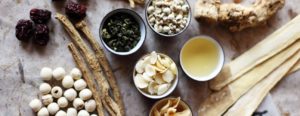WHY YOU CAN’T SLEEP
And How Eastern Medicine Can Help

More than 70 million Americans have trouble sleeping, so if you’re having problems drifting off to dreamland, you’re not alone.
There are so many things that can prevent you from getting to sleep or staying asleep, but getting resolution is key to avoiding health problems related to lack of sleep (like weight gain, high blood pressure, heart disease, or depression).
So read on to learn more about what could be causing your problems sleeping and how eastern medicine can help you hit the snooze button.
Eastern Medicine: The Basics
 Before we start talking about sleep problems, let’s go over the basics of Eastern medicine.
Before we start talking about sleep problems, let’s go over the basics of Eastern medicine.
Chinese Medicine
In Traditional Chinese Medicine (TCM), you possess an energy force called qi (or chi) that is balanced by two opposing forces–yin and yang. Yin is dark and passive, while yang is bright and active. Your yin and yang levels change throughout the day and depending on things like what foods you eat and how much stress is in your life. If your yin and yang balance is wonky, you could have all sorts of problems–including problems sleeping.
Ayurvedic Belief
Ayurvedic medicine comes from India and is more than 3,000 years old. Similar to TCM, Ayurvedic medicine seeks to maintain a balance in your body and mind. In Ayurvedic belief, you have 5 natural elements within you: space, air, fire, water, and earth. These elements combine in our bodies to form 3 different energies or dosha. These are Vata dosha (space and air), Pitta dosha (fire and water), and Kapha dosha (water and earth). Problems sleeping usually stem from an extreme imbalance in your dosha.
5 Reasons You Can’t Sleep and How To Fix Them With Eastern Medicine
 Sleep Apnea
Sleep Apnea
Most people think you have to be overweight to have sleep apnea, but that’s not true! Men and women of any size can struggle with these gaps in breathing while they sleep. Even having a narrow jaw can prevent oxygen from reaching your lungs while you snooze. If you have sleep apnea, you might snore at night and feel especially sleepy during the day.
If your doctor diagnoses you with sleep apnea, they might recommend sleeping on your side, losing some weight, or using a CPAP machine at night.
On the other hand, in Traditional Chinese Medicine (TCM), sleep apnea is thought to be the result of stagnant qi. By increasing the flow of chi, you should be able to get a good night’s sleep. This imbalance is usually treated with acupuncture. In fact, a recent study has proven the practice’s efficacy against this disruptive sleep issue. The researchers found out that manual and electroacupuncture both relieved apnea and improved the flow of oxygen to the body.
An Unbalanced Diet
 Both eastern and western medicine acknowledge the effect of what you eat on your health and happiness. So it’s not surprising that having an unbalanced diet can prevent you from getting to sleep.
Both eastern and western medicine acknowledge the effect of what you eat on your health and happiness. So it’s not surprising that having an unbalanced diet can prevent you from getting to sleep.
Western medicine might caution you against consuming spicy foods later in the day (because they can cause painful and disruptive heartburn), eating a big dinner before bed, or drinking too much caffeine or alcohol. Caffeine stays in your body for up to 6 hours, and alcohol can disrupt your sleep cycle by causing your blood sugar levels to spike. So if a bad diet is the cause of your sleep deprivation, try to eat a light dinner a few hours before you hit the pillow and nix alcohol, spicy food, and too much fat.
The recommendations from TCM are actually pretty similar to those in western medicine. TCM understands difficulty in sleeping as a result of having too much yang in your body which agitates the Heart, the organ most influencing sleep.. To rebalance your yin and yang, ditch alcohol and caffeine along with sweet or spicy foods. This will decrease your yin. To boost your yin levels, try eating more tofu, cucumber, and watermelon. To strengthen your Heart, eat goji berries, pomegranate seeds, beets and meat.
Pain
 Obviously, if you’re in pain you’re not going to be able to rest very well. Pain that disrupts your sleep can come from lots of different things–sore muscles, chronic pain, arthritis, and more. Worst of all, the less sleep you get, the more pain you may be in!
Obviously, if you’re in pain you’re not going to be able to rest very well. Pain that disrupts your sleep can come from lots of different things–sore muscles, chronic pain, arthritis, and more. Worst of all, the less sleep you get, the more pain you may be in!
Usually, this kind of pain is caused by inflammation in the body. In TCM, there are a few different solutions to inflammatory pain. If your qi is stagnant, you need to apply heat to warm it up and get things moving again. However, if you have too much heat in your joints, you may want to try acupuncture or anti-inflammatory foods like turmeric, ginger, strawberries, or green tea.
Recent research has also shown that traditional Chinese herbs called Qing Re Yao can help soothe inflammation as well. There are 54 types of Qing Re Yao herbs that have been proven to reduce inflammation. Some of these are Chinese Skullcap (Huáng Qín),Coptis (Huáng Lián), Japanese Honeysuckle (Jīn Yín Hūa), Forsythia Suspensa (Lián Qiào), and Isatidis Folium (Dà Qīn Yè). For more info on natural ways to treat pain with Eastern medicine, read this!
Too Much Stress
 Did you know that in 2018 alone, stress caused sleep deprivation for 66% of American workers? When you’re worried or stressed, it can feel nearly impossible to rest or relax. In the west, de-stressing techniques usually include ditching screen time and opting for reading. Traditional eastern techniques and practices like yoga and meditation are also highly recommended by western doctors.
Did you know that in 2018 alone, stress caused sleep deprivation for 66% of American workers? When you’re worried or stressed, it can feel nearly impossible to rest or relax. In the west, de-stressing techniques usually include ditching screen time and opting for reading. Traditional eastern techniques and practices like yoga and meditation are also highly recommended by western doctors.
In Chinese medicine terms, when you are stressed, Liver Yang rises, agitating the Heart which is the organ responsible for stress-deprived sleep. Eastern medicine is highly adept at dealing with stress. TCM encourages people who are stressed out to try meditation before bed. It can clear the mind, slow your breathing, and relax your muscles. All of this will decrease your yin levels and make it easier to drift off to dreamland.
Bad Sleep Habits
 Sometimes, we have no one to blame for our trouble sleeping but ourselves. Bad sleep habits like staying up too late, using screens (phone, TV, computer) before bed, or drinking caffeine too late can deeply affect our ability to get good quality sleep.
Sometimes, we have no one to blame for our trouble sleeping but ourselves. Bad sleep habits like staying up too late, using screens (phone, TV, computer) before bed, or drinking caffeine too late can deeply affect our ability to get good quality sleep.
Though these habits can be hard to break, both eastern and western medicine recommend creating new habits that promote rest. Typical western recommendations are to go to bed and wake up at the same time every day, don’t use your bed for anything but sleep, and keep your bedroom cool and comfy.
Eastern medicine has similar advice. Ayurvedic practitioners will recommend that you try to go to sleep before 10 pm every night (Check out this blog on Body Clocks). They also might suggest taking a soothing, warm bath before you go to bed. In Ayurvedic medicine, plants like jasmine and rose can destress and purify you before you hit the pillow. On the other hand, TCM stresses matching your sleep cycle to natural circadian rhythms. Try to rise with the sun in order to keep your yin and yang levels in balance.
Trouble Getting To Sleep?
It can be frustrating to have difficulty getting to sleep. Being tired all the time is annoying, uncomfortable, and can drastically affect the quality of your life. So if you’ve tried western solutions like reducing screen time or popping melatonin gummies, it might be time to give eastern medicine a go.
Have you tried any of these TCM or Ayurvedic methods to get more rest? Let us know if it worked for you!
Newer
The Surprising Reason So Many People Are Turning To Traditional Chinese Medicine To Get Pregnant
Older
The Art And Science Of Traditional Chinese Medicine
Comments (0)
Leave a reply
You must be logged in to post a comment.




